Are artificial fragrances really bad for you?
Most people are familiar with the synthetic fragrances that are added to many products, from perfumes and colognes to laundry detergents and air fresheners.
But what many people don’t realize is that these synthetic fragrances can be extremely bad for your health, leading to headaches, dizziness, nausea, respiratory problems, and even cancer.
In this post, we’ll explore the potential side effects of artificial fragrances and whether or not they are worth the risk.
What are synthetic fragrances?
Synthetic fragrances are man-made chemicals that are used to give products their nice smell.
They are often made with solvents, alcohols, phthalates, parabens and petroleum-based ingredients.
These substances are found in tons of products we use every day, including perfumes, air fresheners, and cleaning products.
Aren’t toxic ingredients regulated?
The FDA regulates that all beauty and personal care products must list their ingredients on the back of the package.
While this is a good step to ensure you know what you are putting on your body, sometimes those ingredient labels can be confusing and not completely transparent.
The word “fragrance” has been protected in the industry for many years as a “trade secret,” meaning that companies do not have to disclose all of the raw materials that make up a fragrance
(you can read more about that regulation here).
They can instead list just “fragrance” or “parfum” as a catch all term.
The International Fragrance Association, the global representative body for the fragrance industry, has published a list of over 3000+ ingredients that could be used to make up “fragrance”, which means that any of these ingredients could be used in your products and not disclosed.
Within the past year, large corporations have announced that they will disclose fragrance ingredients over 0.01% in their products on Smart Label websites.
While this is a big step toward transparency, it can still leave many unanswered questions about what exactly is in your product and what purpose they serve, particularly when you consider the complex list of hundreds of perfume raw materials that go into making up a single fragrance.
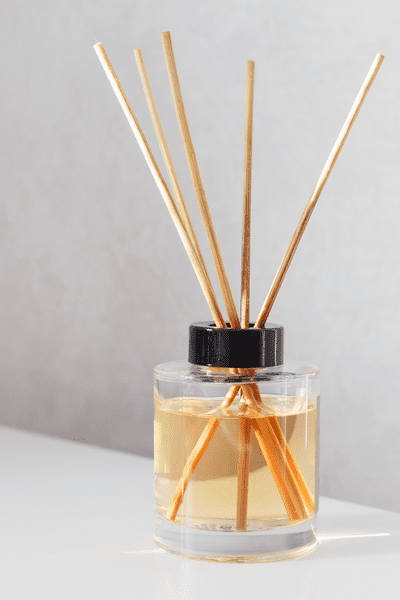
How to tell if a fragrance is synthetic
If a product doesn’t list its fragrance ingredients on the label, it’s likely that it contains synthetic fragrances.
Synthetic fragrances are also often used in products that are labeled “fragrance-free.”
This is because Fragrance-free products can still legally contain up to 0.5% synthetic fragrance chemicals.
This is why it’s important to research brands before making a purchase.
I know it’s extra work but it’s worth it to have peace of mind about what’s in the products you are using.
You might say that you don’t use perfumes or scents that often. But, unfortunately, most of the cosmetics and cleaning products in our house contain these toxic fragrances.
Side effects of artificial fragrances
According to research from The National Center for Biotechnology, The most common types of adverse effects to synthetic fragrance are:
- respiratory problems
- mucosal symptoms
- migraine headaches
- skin problems
- asthma attacks
- neurological problems
- cognitive problems
- gastrointestinal problems
- cardiovascular problems
- immune system problems
as well as several others.
A 2001 study done by the Environmental Protection Agency (EPA) also found that artificial fragrances were often shown to contain hormone disruptors linked to abnormal cell reproduction.
How to avoid synthetic fragrances and chemicals
There are a few simple steps you can take to avoid synthetic fragrances and chemicals.
First, you can go through your home and look at the ingredients of all your home cleaning supplies, personal products, cosmetics, etc.
I know it’s a long process but you’d be surprised just how much in your home contains synthetic fragrances.
I also know it’s not always financially feasible to just throw out all your old products and buy all new ones at once, so maybe try starting with your cleaning products.
I have a whole post on DIY cleaning recipes and how to find non toxic products.
Then maybe next month move onto your skin care. Then your personal care products, makeup, hair care, etc.
You can try to purchase products that are truly fragrance-free, based on your brand research.
You can also look for natural alternatives to products that contain synthetic fragrances and chemicals. I go into that more below.
Finally, be sure to ventilate your home well to reduce your exposure to anything that’s been released into the air.
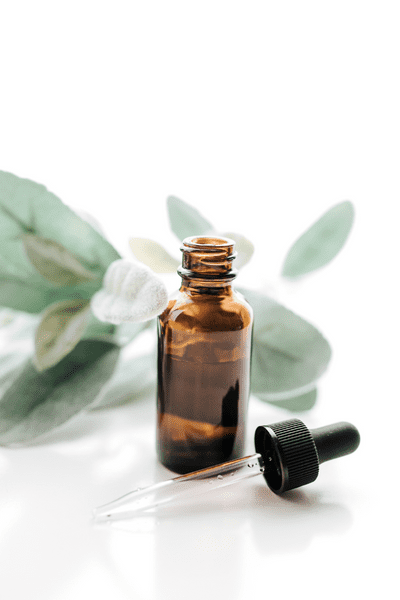
Are all scented products harmful? What are safe fragrances?
No!
There are several options for natural fragrances if you still want to use scented products.
Many products contain a fragrance that is made naturally from plants like essential oils or fruit extracts.
My favorite method for finding out if a product is safe is by using the Think Dirty app.
They give thousands of products a rating from 0 to 10 based on how “dirty” they are, or how many toxic ingredients they contain, with 0 being the safest and 10 being the most hazardous.
They also have a color rating, with green as clean, red as dirty, and yellow as half and half.
Let’s use the detangling spray I use for my daughter’s curly hair as an example:
The Honest Company Conditioning Detangler Spray
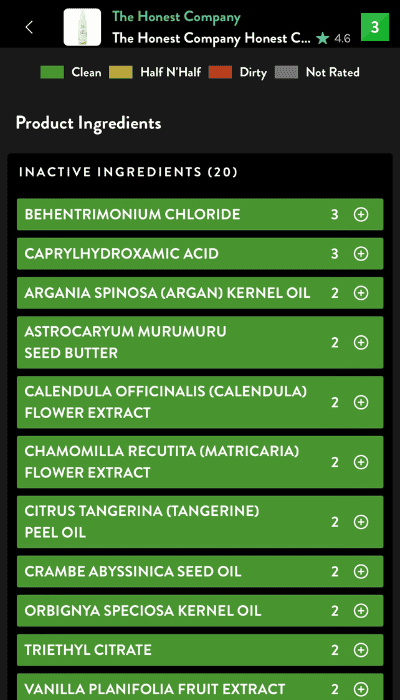
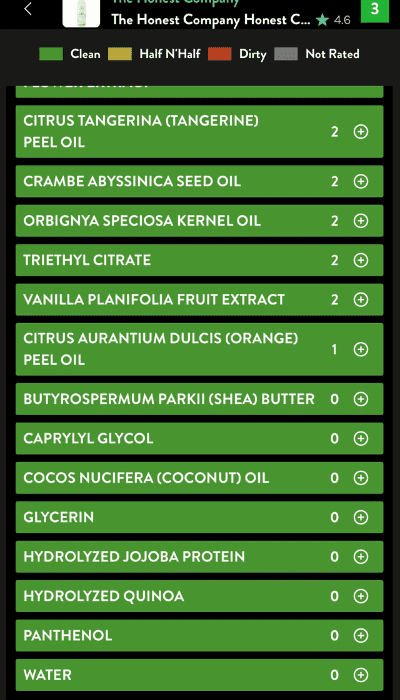
you can see that it has a green rating of 3 which is what we want to see!
It contains 20 ingredients that are all proven to be non-toxic and the fragrance ingredients consist of Chamomile flower extract, tangerine oil, vanilla extract, orange oil and coconut oil.
These are all completely harmless and it smells wonderful.
Best natural alternatives to air fresheners
Air fresheners are one of the worst offenders when it comes to synthetic fragrances because it is concentrated in high doses and is literally designed to be released into the air and breathed in.
But if you still need to mask bad odors or just want your house to smell nice, then here are some great options:
Stove top/simmer potpourri – This is a great way to liven up the home/kitchen, especially during the cold winter months when we can’t open the windows to air out the house.
And it’s so easy to put together. You’re basically just throwing a bunch of spices, herbs, or some fruit peels into a saucepan with water, and letting it simmer on low for as long as you wish.
You can also use a small slow cooker as well. You can find tons of recipes online or on pinterest for great blends and recipes.
Diffuse essential oils – This is my personal favorite and something I do every single day.
Diffusing essential oils does the same thing as an air freshener but can actually provide therapeutic benefits as well.
Diffusers also release the oils into the air continuously or, depending on the diffuser, intermittently so it will last for several hours.
Check out my post on the benefits of essential oils to learn more about how diffusing works.
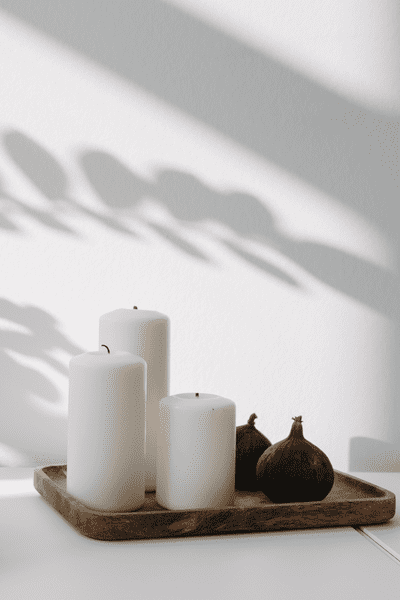
What about candles?
A cozy candle might seem completely harmless, but your scented candles can be just as harmful as air fresheners–especially if it is made with paraffin wax, the fumes could contain cancer-causing chemicals.
When burned, paraffin wax can release toxic volatile organic compounds (VOCs) into the air, including known carcinogens.
I go into more detail on why most candles are not a good idea as well as a great alternative in my post on How To Make Beeswax Candles.
Unscented beeswax candles are a good alternative if you choose to buy candles that are free of scents altogether.
Some scented options are: (always check before purchasing – ingredients can change!)
~ Fontana Candles – beeswax, coconut oil, essential oils
~ Neom Organics – uses pure essential oils
~ Solstice Naturals – a small company that uses carefully chosen ingredients, including essential oils
Ready to make a change?
It’s time to ditch the synthetic fragrances and switch to something that will make you (and your loved ones) healthier.
With just a little effort, you can swap out all of your synthetic fragrance products for safer alternatives, and feel good knowing that you’re doing something good for both yourself and the environment.
Have you made the switch to using only natural fragrances? What has been your experience?
Related Articles:
How To Have A Healthy Home (And What Could Be Making It Unhealthy)

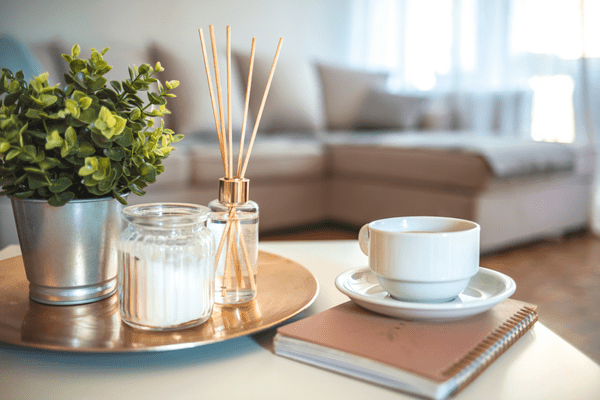




I honestly can’t even be around scented products. I get migraines from them, so I always have to stay away.
I’ve heard of this issue, but it’s great to read a well thought out article about it.
These types of fragrances cause an asthma attack. I hate when people wear fragrance.
Your article on the potential hazards of synthetic fragrances is eye-opening! The information you’ve shared about the hidden risks in scented products is crucial for making healthier choices. Your insights help us understand the importance of being cautious about what we expose ourselves to.
Wow…. I had no idea to be honest and love using my scents bars warmed up in their warmers throughout my home. I will have to look into whether they are artificially fragranced or not…. I hope not as I love them!
I will have to check that app out. All the illnesses associated with synthetic fragrances is worrisome.
This is a really great and very informative post. This synthetic fragrance can be worrisome
That’s alarming! I think my take-away from this post is that I should probably just stick to DIY scenting for the house and use essential oils because you know exactly what you’re getting into!
Very informative and interesting topic to talk about. Synthetic fragrances are always dangerous to our health.
wow! You made me reflect about this. I’ve never thought that a synthetic fragrance can be so dangerous!
I appreciate the knowledge about the Think Dirty app because I do love beautiful scents but I am trying to be more conscious about the toxicity of my surroundings. I will definitely be checking it our, Also, thanks for the info on the candles.
Wow ok this post just pulled me back into reality. Now I am rethinking my Febreze and my dryer sheets. I guess it’s back to the essential oils.
Fragrances make stuff smell good but I know it’s not healthy. I need to start using natural cleaners.